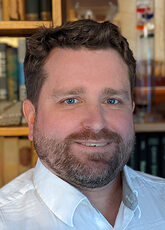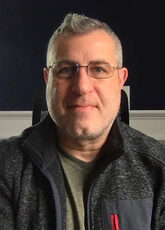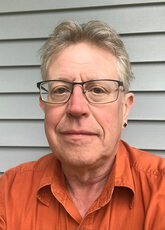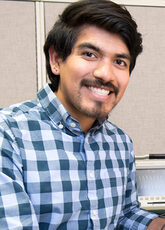The original article was written by Emily Ayshford for Symmetry Magazine.
Earning a doctoral degree is just one way to begin a career in physics. Meet six people who make crucial contributions to particle physics research, without a PhD.






Ryan Herbst, Division Director at SLAC
For several years, he worked for both established companies and young startups in Silicon Valley. But eventually, the excitement wore off. “At the time, I wasn’t interested in a career in research, but after a while, the telecom industry did not offer a lot of interesting R&D challenges,” he says.
Having grown up in the Bay Area, he was familiar with SLAC National Accelerator Laboratory. On a whim he applied—and got—an engineering job there. He was surprised: His group, though part of a large lab, was small and dynamic and felt more like a startup than a small piece of an organization.
“I’ve worked two doors down from a Nobel Prize winner. It was a little overwhelming at first. When I worked in industry, people with PhDs were very quick to point that out, but here, it wasn’t something that was pointed out.”
He ultimately became director for the Instrumentation Division and now leads a team of 55 engineers, firmware designers, sensor scientists and assembly workers. “When I started out, I didn’t see my career going here.”
Bo Hong, Electronic Engineer at SLAC
In the early 1990s, a scientist from SLAC National Accelerator Laboratory came and gave a presentation at the lab. In the audience, Hong realized she disagreed with one of his statements, so she stood up and said so. “That caught his attention,” she says. “I realized that in this field, you have to express yourself and be assertive.” Ultimately, that same scientist recruited her to SLAC in 2001, where she shifted to working on low-level radiofrequency.
“Physicists come up with ideas but need help realizing them,” she says. “Part of my job is to understand what they need and then make those ideas a reality.” Now she spends much of her time designing and simulating systems for experiments.
“Even if you have a PhD, your knowledge must still evolve quickly in this modern world,” she says. “It’s more about getting the training to learn how to learn, because that never ends.”
John De Stefano Jr., IT Services & Systems Engineer at Brookhaven National Laboratory
Out of high school, he worked at a warehouse, until a wooden platform he was standing on broke. By catching himself as the platform fell, he injured his rotator cuff. Out of work after surgery to repair his shoulder, he entered a pre-med program, thinking he could help others rehabilitate after surgery as well. But it didn’t hold his attention, so he switched to an English major with a minor in computer science.
After graduating, he became a technical writer at a telecommunications company and an instructional designer for corporate training software. It was only then that he found his way to a job as an engineer at BNL. “I learned enough about several technologies to be able to write about and teach them well, until I could eventually transition from writing into managing those technologies.”
These days, he is part of the Scientific Data and Computing Center at Brookhaven, where he is responsible for multiple IT services and systems, working with many PhDs in physics and computer science. “When it comes to career success in national laboratories that work in physics…dedication, excitement and passion are even more important than high-level education and training.”
Ashley Getsie, Accelerator Operator at Fermilab
Many physics undergraduates feel the pressure to get a PhD because they are told that is the only way to begin a career path in the field. Ashley Getsie had heard that, too. “It’s almost like you’re expected to do it,” she says. But when she graduated with a physics degree from Rensselaer Polytechnic Institute in 2020, she knew she was ready to take a break from academia and start a job in particle physics.
“I don’t know of any other job that is involved in so many different experiments,” she says. “It’s really good if you’re coming out of college and trying to figure out what you want to specialize in within the particle physics community.”
“There are a lot of jobs out there with just a bachelor’s degree,” she says. “And if you decide to, you can always go back to school at some point.” Many physics graduates she has met have worked for a few years before going back to get a graduate degree, often with the help of a lab’s or a company’s tuition assistance program. “There’s also people who just stay with a bachelor’s degree and still go on to do great things.”
Ronald Richards, Mechanical Engineer at Michigan State University
As an undergraduate industrial design student at Michigan State University, he was hired by the physics department to help make pieces for the E-594 neutrino detector at the US Department of Energy’s Fermi National Accelerator Laboratory. From there, Richards spent his career in particle physics, creating new machines and parts for some of the field’s biggest experiments at Fermilab and CERN.
Working with physicists, he learned to speak their language, and, when at the labs, he looked forward to getting together with everyone at the end of the day to solve problems over beer and food. He never considered his career path—he just kept doing the job he wanted to do, and new opportunities always presented themselves.
“It’s funny that in the heart of a research community, the exact degree one has does not always mean much,” he says. “If they’ve got someone who is reasonable and who can do the job, they will just keep feeding them things to do.”
Miguelangel Machan, Electrical Engineer at Fermilab
Miguelangel Marchan had always been good at math, but when the director of a research program he was a part of at Northern Illinois University suggested that he apply for an internship at Fermilab, he demurred. But the director made him pinkie promise to apply, so he did. That ultimately led him to four internships with the lab—two during his undergraduate program in electrical engineering at NIU and two during his master’s program in electrical engineering at University of Illinois Chicago.
“In my life, I have always been scared to apply for things because I think I am not good enough,” he says. “But the advice I would give to someone is to just apply, even if you are afraid, because the worst-case scenario is that you don’t get it.”
When he finished his degree, he applied to Fermilab once again, this time for a permanent position. Now he works in the Detector Electronics Group, where he designs and tests circuit boards that conduct the readout for detectors.
Read the full article on Symmetry Magazine’s website.
